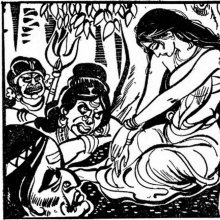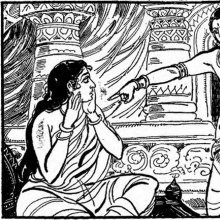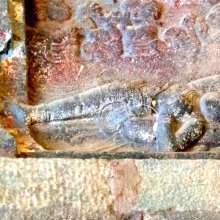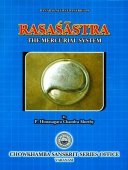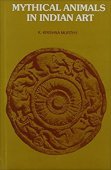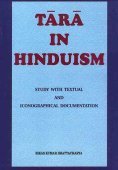Gone: 3 definitions
Introduction:
Gone means something in the history of ancient India, biology. If you want to know the exact meaning, history, etymology or English translation of this term then check out the descriptions on this page. Add your comment or reference to a book if you want to contribute to this summary article.
Images (photo gallery)
India history and geography
Source: Project Gutenberg: Castes and Tribes of Southern India, Volume 1Gone (“sack”) is one of the exogamous septs (divisions) among the Malas (considered the Pariahs of the Telugu country) of the Pokunati section. The Mala people are almost equally inferior in position to the Madigas and have, in their various sub-divisions, many exogamous septs (e.g., Gone).

The history of India traces the identification of countries, villages, towns and other regions of India, as well as mythology, zoology, royal dynasties, rulers, tribes, local festivities and traditions and regional languages. Ancient India enjoyed religious freedom and encourages the path of Dharma, a concept common to Buddhism, Hinduism, and Jainism.
Biology (plants and animals)
Source: Google Books: CRC World Dictionary (Regional names)Gone in India is the name of a plant defined with Salvadora persica in various botanical sources. This page contains potential references in Ayurveda, modern medicine, and other folk traditions or local practices It has the synonym Salvadora crassinervia Hochst. ex T. Anderson (among others).
Example references for further research on medicinal uses or toxicity (see latin names for full list):
· J. Proc. Linn. Soc., Bot. (1860)
· Nomenclator Botanicus (1840)
· Nat. Prod. Res. (2003)
· Species Plantarum (1753)
· Cytologia (1988)
If you are looking for specific details regarding Gone, for example extract dosage, health benefits, side effects, pregnancy safety, chemical composition, diet and recipes, have a look at these references.

This sections includes definitions from the five kingdoms of living things: Animals, Plants, Fungi, Protists and Monera. It will include both the official binomial nomenclature (scientific names usually in Latin) as well as regional spellings and variants.
Languages of India and abroad
Kannada-English dictionary
Source: Alar: Kannada-English corpusGoṇe (ಗೊಣೆ):—[noun] = ಗೊಣೆಯ [goneya].
--- OR ---
Gone (ಗೊನೆ):—
1) [verb] to cause to grow, sprout.
2) [verb] to cause to thrive or prosper.
3) [verb] to praise highly; to laud; to extol.
4) [verb] to be delighted; to be highly pleased; to rejoice.
5) [verb] to have or show an overweening opinion of oneself, one’s position, etc.; to become arrogant or haughty.
6) [verb] to sprout; to grow (oneself).
7) [verb] to succeed; to achieve; to accomplish.
8) [verb] to be satisfied; to fulfil expectations, wishes or desires of oneself.
--- OR ---
Gone (ಗೊನೆ):—
1) [noun] the outermost or utmost point or part; an end; an extremity.
2) [noun] the tip of a creeper, branch of a plant, etc. that has new and young leaves.
3) [noun] a limb of a tree or shrub springing from the trunk or stem or from a bough; a branch.
4) [noun] a root, rhizome of a plant.
5) [noun] an ending; finish; completion; conclusion.
6) [noun] the joint or place where two walls, not being in a straight line, meet.
--- OR ---
Gone (ಗೊನೆ):—[noun] a cluster, bunch of flowers, fruits, nuts, etc.; ಬಾಳುವವನಿಗೊಂದು ಮಾತು, ಬಾಳೆಗೊಂದು ಗೊನೆ [baluvavanigomdu matu, balegomdu gone] b āḷuvavanigondu mātu, b āḷegondu gone (prov.) a sensitive person understands once advised, while a stupid one never.
Kannada is a Dravidian language (as opposed to the Indo-European language family) mainly spoken in the southwestern region of India.
See also (Relevant definitions)
Starts with: Gonegara, Gonegol, Goneha, Gonehakati, Gonekara, Gonemimcu, Goneniogo, Gonephala, Gonera, Gonevan, Goneya.
Ends with (+11): Balegone, Bilgone, Dittigone, Dodda honagone, Dodda-honagone, Elegone, Hangone, Honagone, Kangone, Kirugone, Kolugone, Kurgone, Maragone, Miningone, Mngonengone, Mosale honagone, Mosale-honagone, Muccugone, Mumgone, Ngone.
Full-text (+1533): Vigata, Atita, Adhogata, Apagata, Gata, Yata, Apeta, Nihsrita, Vipanna, Anapeta, Gatapratyagata, Panna, Paragata, Sugata, Vinirgata, Gamyamana, Nivritta, Avita, Vishkanna, Videshagata.
Relevant text
Search found 424 books and stories containing Gone, Goṇe; (plurals include: Gones, Goṇes). You can also click to the full overview containing English textual excerpts. Below are direct links for the most relevant articles:
Vinaya (3): The Cullavagga (by T. W. Rhys Davids)
Cullavagga, Khandaka 5, Chapter 16 < [Khandaka 5 - On the Daily Life of the Bhikkhus]
Cullavagga, Khandaka 10, Chapter 11 < [Khandaka 10 - On the Duties of Bhikkhunis]
Cullavagga, Khandaka 10, Chapter 26 < [Khandaka 10 - On the Duties of Bhikkhunis]
The Catu-Bhanavara-Pali (critical study) (by Moumita Dutta Banik)
(6) The Dasadhamma Sutta < [Chapter 2 - Subject Matter of the First Bhanavara]
(4) Girimananda Sutta < [Chapter 3 - Subject Matter of the Second Bhanavara]
(16) Dhajagga Sutta < [Chapter 2 - Subject Matter of the First Bhanavara]
Bhagavati-sutra (Viyaha-pannatti) (by K. C. Lalwani)
Part 2 - Downward movement of Asurakumāras < [Chapter 2]
Part 3 - Upward movement of Asurakumāras < [Chapter 2]
Part 3 - Trāyas-triṃśaka gods of Asurendra Camara < [Chapter 1]
The Book of Protection (by Piyadassi Thera)
Discourse 1 - Discourse On The Ten Dhammas < [Discourses]
Discourse 15 - Discourse To Girimananda Thera < [Discourses]
Discourse 19 - Discourse To Alavaka < [Discourses]
Vinaya Pitaka (3): Khandhaka (by I. B. Horner)
Fifty on bringing < [7. Kaṭhina]
On the nullifications of guidance < [1. Going forth (Pabbajjā)]
The story of one gone forth when old < [6. Medicine (Bhesajja)]
Sahitya-kaumudi by Baladeva Vidyabhushana (by Gaurapada Dāsa)
Related products
(+2 more products available)
